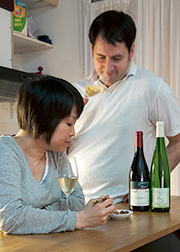General Topics
As a French-Japanese couple, we often find ourselves exploring the differences in Japanese and western food and drink culture. This section is where we share these discussions. Feel free to leave a comment with your own experiences!
-Didier & Mizuki
(日本語) Madame Figaro
Sorry, this entry is only available in Japanese.
Is soup a drink?
“Eat your soup!”
You may have heard this phrase countless times as a child… unless you grew up in Japan that is. In the Japanese language, the verb used for the consumption of soup is nomu ( 飲む ) meaning -to drink-!
What’s a kappou restaurant?
A kappou is a traditional Japanese establishment where the owner/cook is visible from the counter or tables, and can interact with the customers. A sushi kappou is pretty much what we call a sushi bar in the west.
Bread or rice for dinner?
“What would you like for dinner? Bread or Rice?”. In our culture, we are used to considering the protein as the base of a meal. In Japan however, the starch is considered the base of the meal, and traditionally the starch is rice.
Gohan or Kome: different words for “rice”
In Japanese, there are two words for rice: gohan ( 御飯 ) and kome ( 米 ). While the latter is strictly used for actual uncooked rice, the word gohan means cooked rice, but is also the general word for a meal. Rice is considered the base of a traditional Japanese meal, and when one says asagohan ( 朝御飯 ) or yuuhan ( 夕飯 ), meaning breakfast and dinner, one is literally saying the -morning rice- or the -evening rice-.
A “mariage” of East and West
In Japan, alcoholic beverages are never dissociated from food. And yet, the concept of pairing dishes with specific drinks is relatively foreign to traditional Japanese culture. In fact, the term used when speaking of food and wine pairing, mariage, is taken directly from the French language.






